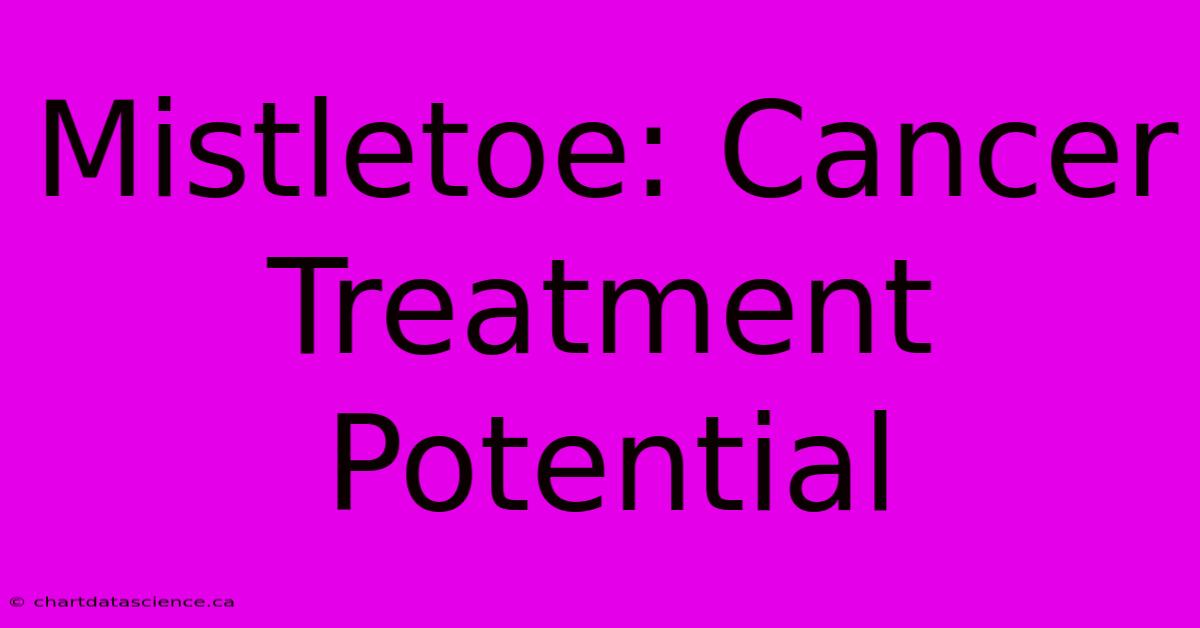Mistletoe: Cancer Treatment Potential

Discover more detailed and exciting information on our website. Click the link below to start your adventure: Visit My Website. Don't miss out!
Table of Contents
Mistletoe: Cancer Treatment Potential – A Comprehensive Overview
Mistletoe, a plant with a long history of symbolic use, particularly around the winter holidays, is also gaining attention for its potential role in cancer treatment. While not a standalone cure, research suggests mistletoe extracts, specifically Viscum album, may offer supportive benefits for cancer patients undergoing conventional therapies. This article explores the current understanding of mistletoe's potential in cancer treatment, highlighting both its purported benefits and the crucial need for further research.
Understanding Mistletoe Extracts and their Components
Mistletoe is a hemiparasite, meaning it derives some nutrients from its host tree while also performing photosynthesis. Different mistletoe species exist, but the one most frequently studied for its medicinal properties is Viscum album. Extracts from Viscum album are used in complementary and integrative medicine, prepared using various methods leading to different preparations with varying compositions. These extracts contain a complex mixture of biologically active compounds, including:
- Lectins: These proteins are believed to be responsible for many of the mistletoe extract's immunomodulatory effects.
- Viscotoxins: These are polypeptides with cytotoxic properties, meaning they can kill cancer cells.
- Polysaccharides: These complex carbohydrates may contribute to the immunomodulatory and anti-inflammatory activities.
- Other components: Mistletoe extracts also contain various other compounds like alkaloids, flavonoids, and phenolic acids, which may contribute to its overall effects.
Mistletoe's Purported Benefits in Cancer Treatment
The primary purported benefit of mistletoe extracts in cancer treatment is their immunomodulatory effect. This means they are believed to influence the body's immune system, potentially enhancing its ability to fight cancer cells. Some proposed mechanisms of action include:
- Stimulating immune cell activity: Mistletoe extracts may stimulate the activity of natural killer (NK) cells and other immune cells, enhancing their ability to recognize and destroy cancer cells.
- Increasing cytokine production: Cytokines are signaling molecules that play a vital role in the immune response. Mistletoe extracts may increase the production of certain cytokines, further boosting the immune system's anti-cancer activity.
- Improving quality of life: Some studies suggest that mistletoe therapy might improve quality of life in cancer patients by reducing pain, fatigue, and other side effects associated with conventional cancer treatment.
It's crucial to understand that these purported benefits are largely based on preclinical studies and observational studies in humans. While some studies have shown promising results, larger, more rigorous clinical trials are needed to confirm these findings and establish the efficacy and safety of mistletoe therapy.
The Importance of Scientific Rigor and Further Research
Despite the anecdotal evidence and some promising preliminary studies, it's vital to emphasize that mistletoe extracts are not a proven cure for cancer. The existing research is often limited by small sample sizes, inconsistent preparation methods, and a lack of randomized controlled trials.
Further research is urgently needed to:
- Standardize mistletoe extract preparations: Ensuring consistent quality and composition of mistletoe extracts is essential for reliable research results.
- Conduct large-scale, randomized controlled trials: These are crucial to definitively determine the efficacy and safety of mistletoe therapy in various cancer types.
- Investigate the precise mechanisms of action: A deeper understanding of how mistletoe extracts interact with the immune system and cancer cells is crucial for optimizing their therapeutic potential.
- Assess potential interactions with conventional cancer treatments: It's important to investigate any potential synergistic or antagonistic effects of mistletoe extracts when used alongside chemotherapy, radiation, or other treatments.
Conclusion: A Promising Area Requiring Further Investigation
Mistletoe extracts hold potential as a supportive therapy for cancer patients, potentially enhancing the efficacy of conventional treatments and improving quality of life. However, it’s absolutely crucial to avoid considering mistletoe as a standalone cancer treatment. The available evidence is still insufficient to draw definitive conclusions about its efficacy. Further rigorous research is essential before any firm recommendations can be made. Always consult with your oncologist or healthcare provider before considering any complementary or alternative therapies for cancer treatment. They can help you weigh the potential benefits and risks based on your individual circumstances and medical history.

Thank you for visiting our website wich cover about Mistletoe: Cancer Treatment Potential. We hope the information provided has been useful to you. Feel free to contact us if you have any questions or need further assistance. See you next time and dont miss to bookmark.
Also read the following articles
| Article Title | Date |
|---|---|
| Director Admits Limited Love Actually Views | Dec 25, 2024 |
| Expectation Free Christmas A Gift | Dec 25, 2024 |
| Santa Cruz Wharf Video Of Damage After Collapse | Dec 25, 2024 |
| Early Boxing Day Deals Shop Now | Dec 25, 2024 |
| American Airlines Flights Temporarily Suspended | Dec 25, 2024 |
